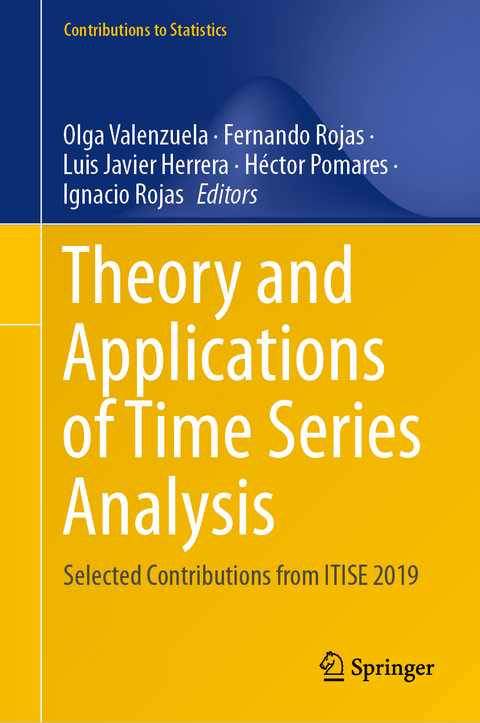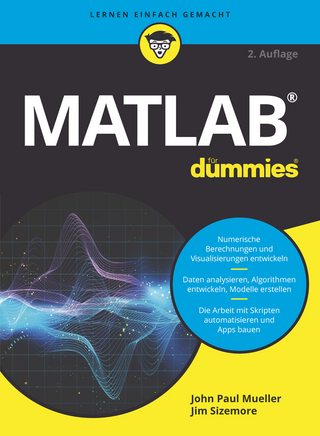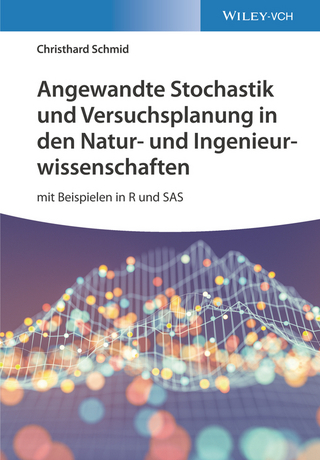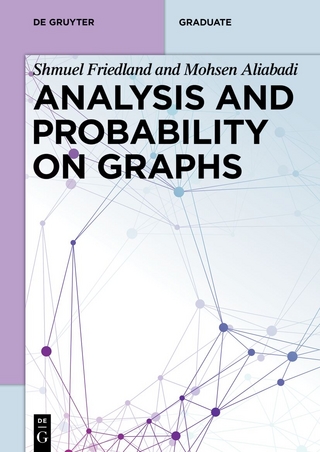
Theory and Applications of Time Series Analysis
Springer International Publishing (Verlag)
978-3-030-56218-2 (ISBN)
This book presents a selection of peer-reviewed contributions on the latest advances in time series analysis, presented at the International Conference on Time Series and Forecasting (ITISE 2019), held in Granada, Spain, on September 25-27, 2019. The first two parts of the book present theoretical contributions on statistical and advanced mathematical methods, and on econometric models, financial forecasting and risk analysis. The remaining four parts include practical contributions on time series analysis in energy; complex/big data time series and forecasting; time series analysis with computational intelligence; and time series analysis and prediction for other real-world problems. Given this mix of topics, readers will acquire a more comprehensive perspective on the field of time series analysis and forecasting.
The ITISE conference series provides a forum for scientists, engineers, educators and students to discuss the latest advances and implementations in the foundations, theory, models and applications of time series analysis and forecasting. It focuses on interdisciplinary research encompassing computer science, mathematics, statistics and econometrics.
lt;p>
Olga Valenzuela is an Associate Professor at the Department of Applied Mathematics, University of Granada, Spain, where she received her Ph.D. in 2003. She has worked as an invited researcher at the Department of Statistics, University of Jaen, Spain, and at the Department of Computer and Information Science, University of Genova, Italy. Her research interests include optimization theory and applications, statistical analysis, fuzzy systems, neural networks, time series forecasting using linear and non-linear methods, evolutionary computation and bioinformatics. She has published more than 65 papers listed in the Web of Science.
Fernando Rojas is an Associate Professor at the University of Granada, Spain, where he received his Ph.D. in 2004. His research focuses on signal processing, artificial intelligence techniques for optimization, including evolutionary computation, fuzzy logic, neural networks etc., and the study of computer architectures for parallel processing in complex problems, such as time series prediction. He has published over 25 articles in JCR-indexed journals. A former coordinator of the Master's Degree in Computer and Network Engineering at the University of Granada, he has been the secretary of the Master's Degree in Data Science and Computer Engineering since 2014, and the secretary of the Department of Architecture and Computer Technology at the University of Granada since 2018.
Luis Javier Herrera is an Associate Professor at the University of Granada, Spain, where he received his Ph.D. in 2006. His research focuses on machine learning techniques (fuzzy logic, deep learning, genetic algorithms, etc.), and on their optimization and application over a wide range of scientific problems related to classification, approximation and time series prediction, sometimes requiring high-performance computing systems. These applications include relevant problems in several fields such as biomedicine, bioinformatics, biochemistry, physics, optics, etc. He has published more than 40 papers in JCR-indexed journals. Over the last several years, he has (co-)led a number of research projects backed by national and regional funding entities.
Héctor Pomares has been a Full Professor at the University of Granada, Spain, since 2001. He has published more than 50 articles in JCR-indexed journals and contributed over 150 papers to international conferences. He has led or participated in 15 national projects, one independent R&D Excellence project and 13 contracts for innovative research through the University of Granada Foundation Company and the Office of Transfer of Research Results. He has been a visiting researcher at numerous prestigious research centers outside Spain. He is currently a member of the editorial board of the Journal of Applied Mathematics (JCR-indexed) and the coordinator of the Master's Degree in Computer & Network Engineering at the University of Granada.
Ignacio Rojas is a Full Professor at the Department of Computer Architecture and Computer Technology, University of Granada, Spain. Throughout his research career, he has served as a principal investigator or otherwise participated in more than 20 research projects obtained in competitive tenders, including projects for the European Union, the I+D+I Spanish National Government and the Unit of Excellence of the Ministry of Innovation, Science and Enterprise Junta de Andalucía. He has published more than 260 scientific contributions listed in the Web of Science, including 90 articles in JCR-indexed journals.
Part I: Advanced Statistical and Mathematical Methods for Time Series Analysis.- Random Forest Variable Selection for Sparse Vector Autoregressive Models (Dmitry Pavlyuk).- Covariance functions for Gaussian Laplacian fields in higher dimension (Gyorgy Terdik).- The Correspondence between Stochastic Linear Diference and Diferential Equations (D. Stephen G. Pollock).- New test for a random walk detection based on the arcsine law (Konrad Furmanczyk, Marcin Dudzinski and Arkadiusz Orlowski).- Part II: Econometric Models and Forecasting.- On the automatic identification of Unobserved Components Models (Diego J. Pedregal and Juan R. Trapero).- Spatial integration of pig meat markets in the EU: Complex Network analysis of nonlinear price relationships (Christos Emmanouilides and Alexej Proskynitopoulos).- Comparative Study of Models for Forecasting Nigerian Stock Exchange Market Capitalization (Nura Isah, Basiru Yusuf and Sani I.S. Doguwa).- Industry Specifics of Models Predicting Financial Distress (Dagmar Camska).- Stochastic volatility model's predictive relevance for Equity Markets (Per B Solibakke).- Empirical test of the Balassa-Samuelson Effect in Selected African Countries (Joel Hinaunye Eita, Zitsile Zamantungwa Khumalo and Ireen Choga).- Part III: Energy Time Series Forecasting.- End of charge detection of batteries with high production tolerances (Andre Loechte, Ole Gebert and Peter Gloesekoetter).- The effect of Daylight Saving Time on Spanish Electrical Consumption (Eduardo Caro Huertas, Jesus Juan Ruiz, Marta Mana Sanchez, Jesus Ruperez Aguilera, Carlos Rodriguez Huidobro, Ana Rodriguez Aparicio and Juan Jose Abellan Perez).- Wind Speed Forecasting Using Kernel Ridge Regression (Mohammad Alalami, Maher Maalouf and Tarek El Fouly).- Applying a 1D-CNN Network to Electricity Load Forecasting (Christian Lang, Florian Steinborn, Oliver Steffens and Elmar W. Lang).- Long and Short Term Prediction of Power Consumption using LSTM Networks (Juan Carlos Morales, Salvador Moreno, Carlos Bailon, Hector Pomares, Ignacio Rojas and Luis Javier Herrera).- Part IV: Forecasting Complex/Big data problems.- Freedman's Paradox: a Solution Based on Normalized Entropy (Pedro Macedo).- Mining News Data for the Measurement and Prediction of Inflation Expectations (Diana Gabrielyan, Lenno Uuskula and Jaan Masso).- Big Data: Forecasting and Control for Tourism Demand (Miguel Angel Ruiz Reina).- Traffic Networks via Neural Networks: Description and Evolution (Alexandros Sopasakis).- Part V: Time Series Analysis with Computational Intelligence.- A Comparative Study on Machine Learning Techniques for Intense Convective Rainfall Events Forecasting (Matteo Sangiorgio, Stefano Barindelli, Valerio Guglieri, Riccardo Biondi, Enrico Solazzo, Eugenio Realini, Giovanna Venuti and Giorgio Guariso).- Long-Short Term Memory Networks for the Prediction of Transformer Temperature for Energy Distribution Smart Grids (Francisco Jesus Martinez-Murcia, Javier Ramirez, FerminSegovia, Andres Ortiz, Susana Carrillo, Javier Leiva, Jacob Rodriguez-Rivero and Juan Manuel Gorriz).- Deep Multilayer Perceptron for Knowledge Extraction: Understanding the Gardon de Mialet Flash Floods Modelling (Bob E. Saint Fleur, Guillaume Artigue, Anne Johannet and Severin Pistre).- Forecasting short-term and medium-term time series:a comparison of artificial neural networks and fuzzy models (Tatiana Afanasieva and Pavel Platov).- Inflation Rate Forecasting: Extreme Learning Machine as a Model Combination Method (Jeronymo Marcondes Pinto and Emerson Fernandes Marcal).- Part VI: Time Series Analysis and Prediction in Other Real Problems.- Load Forecast by Multi Task Learning Models: designed for a new collaborative world (Leontina Pinto, Jacques Szczupak and Robinson Semolini).- Power transformer forecasting in smart grids using NARX neural networks (Javier Ramirez, Francisco J. Martinez Murcia, Fermin Segovia, Andres Ortiz, Diego Salas-Gonz_alez, Susana Carrillo, Javier Leiva, Jacob Rodriguez- Rivero and Juan M. Gorriz).- Short term forecast of emergency departements visits through calendar selection (Cosimo Lovecchio, Mauro Tucci, Sami Barmada, Andrea Serafini, Luigi Bechi, Mauro Breggia, Simona Dei and Daniela Matarrese).- Discordant Observation Modelling (Sonya Leech and Bojan Bozic).- Applying Diebold-Mariano test for performance evaluation between individual and hybrid time series models for modeling bivariate time series data and forecasting the unemployment rate in the USA (Moamen Abbas Mousa Al-Sharifi and Firas Ahmmed Mohammed Al-Mohana).
| Erscheinungsdatum | 06.01.2021 |
|---|---|
| Reihe/Serie | Contributions to Statistics |
| Zusatzinfo | XIV, 460 p. 195 illus., 141 illus. in color. |
| Verlagsort | Cham |
| Sprache | englisch |
| Maße | 155 x 235 mm |
| Gewicht | 875 g |
| Themenwelt | Mathematik / Informatik ► Mathematik ► Wahrscheinlichkeit / Kombinatorik |
| Wirtschaft ► Allgemeines / Lexika | |
| Schlagworte | Artificial Intelligence • complex and big data time series • econometric models and forecasting • Energy forecasting • financial forecasting • forecasting theory and adjustment • hierarchical forecasting • mathematical finance • pattern recognition • prediction of time series • risk analysis • statistical methods for time series • Time Series Analysis • time series with computational intelligence • times series in energy |
| ISBN-10 | 3-030-56218-2 / 3030562182 |
| ISBN-13 | 978-3-030-56218-2 / 9783030562182 |
| Zustand | Neuware |
| Informationen gemäß Produktsicherheitsverordnung (GPSR) | |
| Haben Sie eine Frage zum Produkt? |
aus dem Bereich


